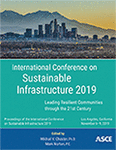International Conference on Sustainable Infrastructure 2019
Sustainability in the Developing World: An Investigation on How Emerging Economies Are Performing
Publication: International Conference on Sustainable Infrastructure 2019: Leading Resilient Communities through the 21st Century
ABSTRACT
With worldwide efforts directed towards creating sustainable societies, how is the developing world coping with this trend? Often times we see groundbreaking innovations that contribute towards sustainable practices come from the developed world. However, we almost never see such technologies come from developing countries. How far behind in sustainability are such societies? To answer, an investigation examining the indicators of sustainable development is needed. Access to clean water sources, access to proper sanitation facilities, access to energy, emissions, and more are among some of those indicators. The purpose of this research is to raise awareness to the fact that at the end of the day we share the planet. If a small percentage of the world prides itself in achieving sustainability, how good is it if the majority of the countries are causing the depletion of the world’s natural capital, contributing in desertification, and more importantly accelerating climate change.
Get full access to this chapter
View all available purchase options and get full access to this chapter.
REFERENCES
Acciona. (2018). “TOP 5 MOST POLLUTING COUNTRIES”. Active Sustainability. <https://www.activesustainability.com/environment/top-5-most-polluting-countries/> (Nov. 20, 2018).
Carbon Dioxide Information Analysis Center. (2014). "CO2 emissions (metric tons per capita)". World Bank Data: <https://data.worldbank.org/indicator/EN.ATM.CO2E.PC> (Nov. 20, 2018).
Gwénaëlle Legros, I. H. (2009). THE ENERGY ACCESS SITUATION IN DEVELOPING COUNTRIES. New York: United Nations Development Programme & World Health Organization.
International Energy Agency. (2016). “Statistics”. Energy Atlas. <http://energyatlas.iea.org/#!/tellmap/1378539487> (Jan. 15, 2019)
International Energy Agency. (2018). Global Energy & CO2 Status Report. Paris: International Energy Agency.
UNEP. (2011). Towards a Green Economy: Pathways to Sustainable Development and Poverty Eradication, Geneva: UN.
United Nations. (2015). “Goal 6: Ensure access to water and sanitation for all”. Sustainable Development Goals <https://www.un.org/sustainabledevelopment/water-and-sanitation/> (Jan. 15, 2019)
World Bank. (2015). “Electricity production from oil, gas and coal sources (% of total)”. World Bank Data: <https://data.worldbank.org/indicator/EG.ELC.FOSL.ZS?end=2015&start=1982&year_high_desc=false>(Jan. 15, 2019)
World Bank. (2015). “People using safely managed drinking water services (% of population)”. World Bank Data: <https://data.worldbank.org/indicator/SH.H2O.SMDW.ZS> (Jan. 15, 2019)
World Commission on Environment and Development. (1987). Our Common Future. Oslo: World Commission on Environment and Development. Academic Impact.
Information & Authors
Information
Published In
International Conference on Sustainable Infrastructure 2019: Leading Resilient Communities through the 21st Century
Pages: 602 - 606
Editors: Mikhail V. Chester, Ph.D., Arizona State University, and Mark Norton, Santa Ana Watershed Project Authority
ISBN (Online): 978-0-7844-8265-0
Copyright
© 2019 American Society of Civil Engineers.
History
Published online: Nov 4, 2019
Authors
Metrics & Citations
Metrics
Citations
Download citation
If you have the appropriate software installed, you can download article citation data to the citation manager of your choice. Simply select your manager software from the list below and click Download.
